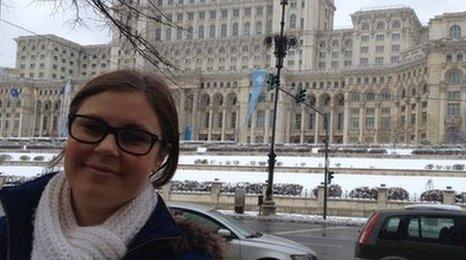Meeting the Romanian jobseekers
- Published
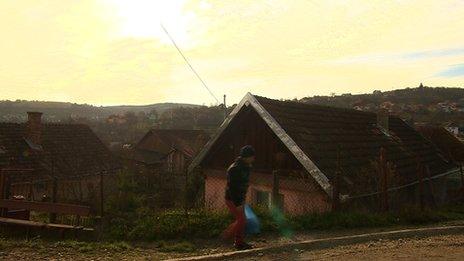
Migration is a way of life for many Romanians and has been for years
On 1 January work restrictions will be relaxed for Romanian and Bulgarian immigrants entering the UK - there is uncertainty about what the effects might be.
"We have an image problem," said Andrei Misan, as he headed off to pay for the airport car park.
Since he'd only driven his car in there to pick me up, I'd offered to pay the small fee, but he refused to take any money from me. "It's a matter of principle," he added.
Romanians like Andrei, 30, certainly do have an image problem.
Andrei Misan: "People returning from the UK have found it a good place to work"
They are pilloried in the press, often confused with Europe's Roma peoples, who live across the continent, and are accused by politicians of simply wanting to move from their country in order to claim better welfare benefits elsewhere in the EU.
As he drove us into the centre of his home town, Cluj-Napoca in Transylvania, Andrei admitted that some of the image problems are down to Romanians themselves.
"The way we built our image, the way our culture is, the way we dealt with people who wanted to leave and the way we dealt with the minorities - especially the 'Roma problem', as you call them.
"We have been having this image problem for a very long time, nothing is going to change now."
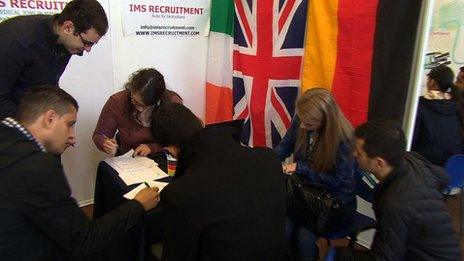
Of the three million Romanians living abroad in the EU, it is estimated almost two million live in Italy and Spain
Andrei worked in Britain, on a building site, back in 2006 before Romania joined the EU. He had only gone to the UK to find a job and earn some money, he says.
"It's five to 10 years that we've had people going to the UK. By the time I went there in 2006 I worked on a site where there were 70 Romanians and the company was Romanian."
The rule changes on 1 January will not let the first Romanians in - they've been coming for years.
Under the rules of the European single market - which are designed to make trading in everything from MP3s to workers simple and therefore cheaper - people who come from an EU country can move around the union to sell their skills.
When Romania and Bulgaria joined in 2007, there were special restrictions applied to people from those countries because of the fears some EU nations had of a flood of immigrants from some of the poorest parts of Europe.
Romanians have been emigrating ever since their brutal communist dictatorship collapsed just over 20 years ago.
"In the '90s it was Germany," says Andrei. "Then it was Italy and Spain which are still the most Romanian-populated countries in Europe."
Of the three million Romanians living abroad in the EU, it is estimated almost two million live in those two countries. The languages are similar, making it easier for migrating workers.
Now, however, Andrei says the UK is where his friends prefer.
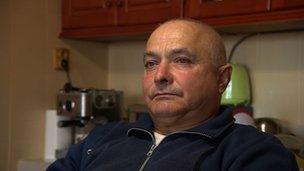
Ioan Valcan's daughters have both moved to Spain in search of employment
"They've seen many Romanians returning from Italy and Spain and they didn't make enough money to stay abroad. The ones in the UK are finding it a good place to work."
Even under the current restrictions he and fellow Romanians were allowed to go to the UK and to look for work.
Romania is one of Europe's poorest countries, from where many wish to escape.
Like the daughters of Ioan Valcan. They went to Spain 10 years ago.
"One daughter works as a cleaner - for the last 10 years - the other at a petrol station."
Every family in his town, about an hour's drive away from Cluj, is said to have someone either there or in Italy.
Ioan himself worked in Spain as a builder before coming back to Romania to build his own house.
He insists we drink some palinca, a homemade plum brandy to go along with the coffee he's just poured in his kitchen.
"Spain has more opportunities at the moment but they hope to come home one day. I'd like them to," he says.
In the centre of Cluj, in the old communist-built cultural centre, there's a jobs fair to attract people to the west.
People filter in through the afternoon. Lots of people - especially the young - do still want to leave Romania. They are looking for better jobs, better wages, and better living conditions.
This process has been going on for years. Whatever politicians try to convince us, it's impossible to predict whether the changes on 1 January will accelerate the process.
Cristian Nicolaie says he would look for a job as a driver before looking for something in his profession
Among the people at the fair is Andrea Hangan - a dentist, and her boyfriend, an engineer. They're looking to build a new life elsewhere.
"I'm here because I'm looking for a job in Ireland. I want to go there because we have some friends there. "
"I was looking also in France but I don't know the language."
Had she considered the UK?
"Yes, but I decided that Ireland is better. It's another system, a private system - in England it's not a private system for dentists."
Still, on the cobbled streets of Cluj close to the whitewashed house in which Matthias Corvinus - the 15th Century King of Hungary - was born, another potential migrant has already made up his mind.
Basic economics
Cristian Nicolaie worked in Britain last summer as a delivery driver. He made as much in a week as he could make in six months here, he says.
"Here it's 200 euros (£165), max 300 euros (£248) per month."
At the moment his brother is in Sheffield looking for a job.
"My brother can't find the work because he doesn't have the right to work."
The regulations allowed people to apply for jobs in the UK in a limited number of areas. The changes on 1 January will allow Cristian and his brother to apply for any job.
And Cristian has already decided to escape Romania's low wages. "Of course I'm going back to Britain," he says.
Getting out of Romania will get easier with the rule change, but many did not wait for this moment to migrate across Europe. They've already left, and are building lives elsewhere.
However, with the image Romanians now conjure up in the popular imagination in countries like the UK, Andrei Nicolaie says getting a job "is harder than it used to be".
"It depends on what type of work you want to do - if you want to be a labourer in construction you can find a job within a week of arriving in the UK."
He says the political debate has created a Romanian stereotype that just isn't realistic.
He adds that he doesn't think there will be a massive influx of people from Romania and Bulgaria come 1 January.
They all went before the 2012 Olympics, he says, to build the stadia.
"The idea that people are waiting to go to the UK is wrong. Everybody knew that it was good to go to the UK before the Olympics.
"Everyone who wanted to go there, who saw that as a place they could work in and get money from, already went. There's not a group of people waiting for a chance to go to the UK. They already went."
- Published3 November 2014

- Published27 November 2013
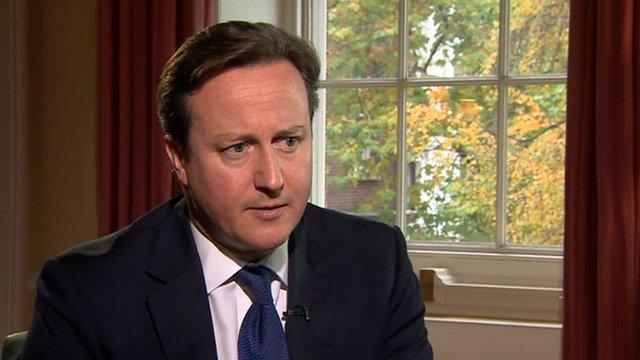
- Published25 November 2013
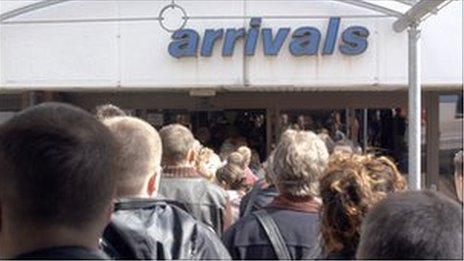
- Published2 December 2013
